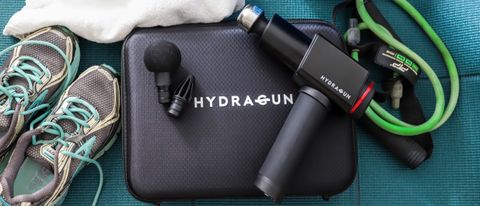TechRadar Verdict
The Hydragun has a premium build, works marvellously well to soothe strained and fatigued muscles, but also comes with a relatively premium price tag. It’s cheaper than a Theragun Pro or Theragun Elite, though, and ships with six attachments and has six speed options. It doesn’t come with all the features of a Theragun, like Bluetooth support for a connected app and an OLED display, but the Hydragun does exactly what it says on the tin – relieves everyday aches and pains, and loosens tight muscles after a workout.
Pros
- +
Relatively quiet
- +
Ergonomic design
- +
6 attachments and speed settings
Cons
- -
Lowest setting aggressive for sensitive areas
- -
Expensive for some
Why you can trust TechRadar
Editor's Note
• Original review date: July 2021
• No new model has been launched since
• Launch price: $299 / AU$399 (unavailable in the UK at launch)
• Now available in the UK as well for £269
Updated: March 2024. When Hydragun launched as a company, it was with just one product going by the same name – a premium massage gun that didn't come with the high-end price tag like a Theragun. While a smaller Hydragun Atom Mini is now available for $199 / £179 / AU$349, the original is still better value and we stand by our original review below.

Hydragun massage gun: One-minute review
Massage guns are all the rage now and Hydragun is claiming a piece of that pie. In the recent working-from-home culture, it doesn’t take very much for us to feel sore by the end of day, and taking on the muscle fatigue after a workout is additional stress on the body. While there’s nothing like a long massage by an actual person, we don’t usually have that luxury – and that’s where massage guns come in.
Hydragun is similar to most other massage guns on the market, shipping with six different attachments to target different muscle groups, with six different speeds to choose from. And it does exactly what it says on the tin – kneads muscles to try and get to deep tissue knots to relieve soreness and fatigue by stimulating blood supply to the inflamed areas.
While it works marvellously well on most large muscle groups, it can feel quite aggressive in some others. For example, if you use it along the curve of the neck and shoulder, it may feel like your brain is vibrating, even on the lowest setting, making it an uncomfortable experience. If you can bear it for a few minutes, though, there’s nothing like a little kneading with the Hydragun to remove the soreness you feel after an entire day in front of the computer or relax sore muscles after a particularly strenuous workout.
What we like about the Hydragun is the ability to reach that annoying corner of the shoulder blade that gets sore after using a mouse at a desk. Used with the bullet attachment, it can dig into the muscle there to relieve pain, but if it’s a chronic issue, something like a specialist trigger point tool is far more effective.
That said, when it comes to combating the everyday aches and pains of working at a desk all day, or relaxing after a strenuous workout, the Hydragun is more than a match for those. It might be an expensive investment at full price, but a part of that cost is justified by the premium materials used to make the product and how well-balanced it feels when using. It’s also pretty quiet for a massage gun.
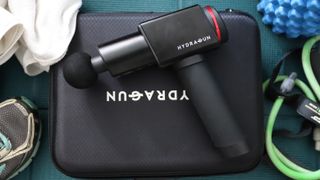
Hydragun massage gun review: price and availability
- Available direct to consumer
- List price: $299 / £269 / AU$399
The Hydragun isn’t available in retail stores. Instead, you get it online, directly from the company. Hydragun has online storefronts for the UK, Australia, New Zealand, Singapore, Hong Kong and the United States, the last one also catering to the rest of the world if the product needs to ship elsewhere.
At $299 / £269 / AU$399 a pop, it is expensive, but comes in cheaper than the likes of the Theragun Pro and the Theragun Elite, although these two premium models offer more features than the Hydragun.
Shipping is free in the countries with a local version of the online store (the product ships around the world from the US), plus there’s a 30-day risk-free return policy if you’re not happy with the product. Return shipping, however, is at your personal cost. If you’re worried about the longevity of the massage gun, there’s a 1.5-year warranty available as well.
Several other cheaper options are usually listed on sites like Amazon, but these brands may not have worldwide availability.
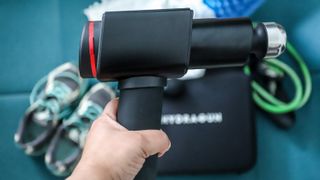
Hydragun massage gun review: design
- Familiar gun-like design
- Ergonomic grip
- Several attachments
Like most massage guns currently available, the Hydragun ships in a semi-soft travel case that also encloses some extra freebies like a protein bar, eye gel, nasal spray and curated playlists to help you relax.
The massage gun itself is made from premium, futuristic materials like aerospace-grade aluminum and nano silica gel (used in the grip), which might explain why it costs as much as it does. The six attachments that come with the gun, however, don’t share the premium materials, but they look good and are pretty sturdy.
The attachments are two stainless steel flatheads, one plastic flathead, one soft ball head, a fork and a bullet – most target the larger muscle groups, but some can be used for deep-tissue massage and bony areas like ankles. Also in the case is a charging cable and, depending on where the product is being shipped to, a couple of adaptors so you can use the Hydragun anywhere in the world.
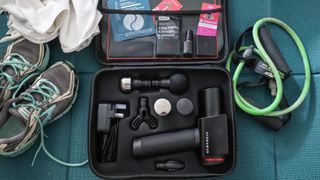
The massage gun feels heavy – weighing 2.3lbs/1.04kg – but is very well balanced and you soon get used to the heft, with absolutely no strain on the wrist. The weight might be due to the battery (2,600mAh that lasts up to 6 hours) and motor, both of which are better performers than the Theragun options. For example, the Theragun Pro uses replaceable batteries that promise up to 150 minutes per battery, while the motor pumps at a top speed of 2,400rpm as compared to the Hydragun’s 3,600rpm.
The single control button for the Hydragun is on the back panel of the device, which is also made of the same silicone as the grip. The power button in the middle not only turns the gun on and off, but also cycles through the six speed settings. Arranged horizontally and vertically around the power button are the LED indicators for speed and battery level.
On the top edge of the circular rear panel is also a ‘stall’ indicator that detects torque pressure and lights up if you’re pressing too much. While it’s good to have that option, we didn't see it come on during out testing as we didn’t push hard enough to trigger a warning – it hurts plenty on sore muscles even when lightly held. That said, you’ll obviously never see the stall indicator come on if you happen to be using the Hydragun on your back or neck.
And that’s it – there’s no companion app, like the one for the Bluetooth-enabled Theragun Pro and Elite models that allow you customize precise speeds, or the OLED digital display on these premium models.
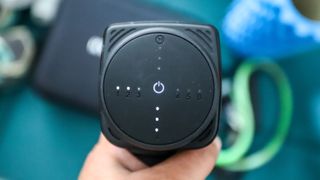
Hydragun massage gun review: performance
- Up to 6 hours of battery life
- Vibrations rather than pulsing movements
- Quiet for a massage gun
The Hydragun can be used at any stage of your workout routine – you could do a quick massage before, during your exercise routine, or a more prolonged session after. It’s easy enough to fit a flathead or the soft ball head to the gun and carry in your gym bag. Being battery operated, with a pretty impressive battery life, means you can use it away from any mains.
The best part about using it anywhere is how quiet it actually is. If you’re in a locker room, it won’t be louder than someone talking. It registers at about 30dB on a decibel meter, which is about as much as an electric toothbrush. In contrast, some Theraguns are pretty loud, buzzing as loud as a vacuum cleaner.
The motor offers six different speeds ranging from 1,200rpm to 3,200rpm and even the lowest setting can provide relief, although it depends on the specific use case. After a particularly intense workout, we found the middle 2,000rpm or 2,400rpm setting to be the most effective on 2-minute sessions, but the lowest speed can also feel very intense on areas like the neck. When we used the bullet attachment on the low 1,200 rpm setting to knead out the effects of 8 hours spent at a computer, it was still vigorous enough to make it hard to breathe. That said, not everyone will be so sensitive to vibrations and the Hydragun will work on most muscle groups without any side effects.
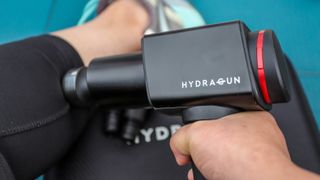
You’ll need to be careful when using the Hydragun on or near bony areas – like along the spine or near the ankle – as the gun tends to bounce off the harder surfaces. While it doesn’t hurt if you accidentally move over a bone, the thrust away from the body can be a hard jolt that may cause you to drop the pulsating device.
Speaking of pulsating, you can see this happen only at the lowest speed of 1,200rpm. Anything above that looks and feels more like vibrations which, if you really want to go deep tissue, doesn’t always provide relief, like the corner of the scapula where many of us suffer from muscle contraction caused by using a mouse for days together.
For the usual aches and pains, and sometimes for even more severe muscular injuries, the Hydragun does a brilliant job of reducing soreness and pain. Using the Hydragun for a few minutes each day helped reduce the pain of a particularly nasty calf muscle injury considerably during our testing, allowing the area to heal fully.
Note that the Hydragun switches off automatically after 15 minutes of constant use, which is an excellent failsafe because it’s very tempting to keep massaging a sore area for longer only because it feels so good.
Should I buy the Hydragun massage gun
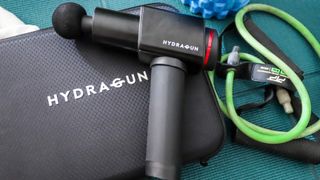
Buy it if...
You need muscle relief after regular workouts
If you love working out, and usually do an intense session a few times a week, the Hydragun can help you prevent delayed onset of muscle soreness (or DOMS). Even those who don’t do strenuous spin classes can still take advantage of the Hydragun. It’s also great for those everyday aches and pains that you might suffer after working at a desk all day.
You’re prone to muscle cramps
There are medical conditions that cause muscular pain and cramps, like vitamin and mineral deficiencies or even the effects of a Covid-19 infection. While a massage gun isn’t a cure, it can help provide temporary relief so you can get on with other tasks, but be sure to speak to a health professional to get the best medical advice for these conditions.
Don't buy it if...
You’re on a budget
While the Theragun Pro is one of the most expensive massage guns on the market, there are some very affordable knock-offs available that are, to be fair, can be good too. The Hydragun, while cheaper than a Theragun, isn’t as affordable as those knock-offs. So if your budget doesn’t stretch too far, you may be able to find cheaper options.
You suffer from chronic muscle tightness
While a quick pummeling with a massage gun can leave you feeling better, it’s not a cure for chronic conditions. People who suffer from chronic muscle tightness may find temporary relief while using the Hydragun, but it’s not a substitute for physiotherapy or remedial massage.
[First reviewed July 2021]

Sharmishta is TechRadar's APAC Managing Editor and loves all things photography, something she discovered while chasing monkeys in the wilds of India (she studied to be a primatologist but has since left monkey business behind). While she's happiest with a camera in her hand, she's also an avid reader and has become a passionate proponent of ereaders, having appeared on Singaporean radio to talk about the convenience of these underrated devices. When she's not testing camera kits or the latest in e-paper tablets, she's discovering the joys and foibles of smart home gizmos. She's also the Australian Managing Editor of Digital Camera World and, if that wasn't enough, she contributes to T3 and Tom's Guide, while also working on two of Future's photography print magazines Down Under.

New Zealand government claims it also suffered attacks from Chinese hacking groups

3 Body Problem's headset is not the VR we want – it's our worst nightmare

Nvidia's fastest AI chip ever could cost a rather reasonable $40,000 — but chances that you will actually be able to buy one on its own are very, very low and for a good reason
